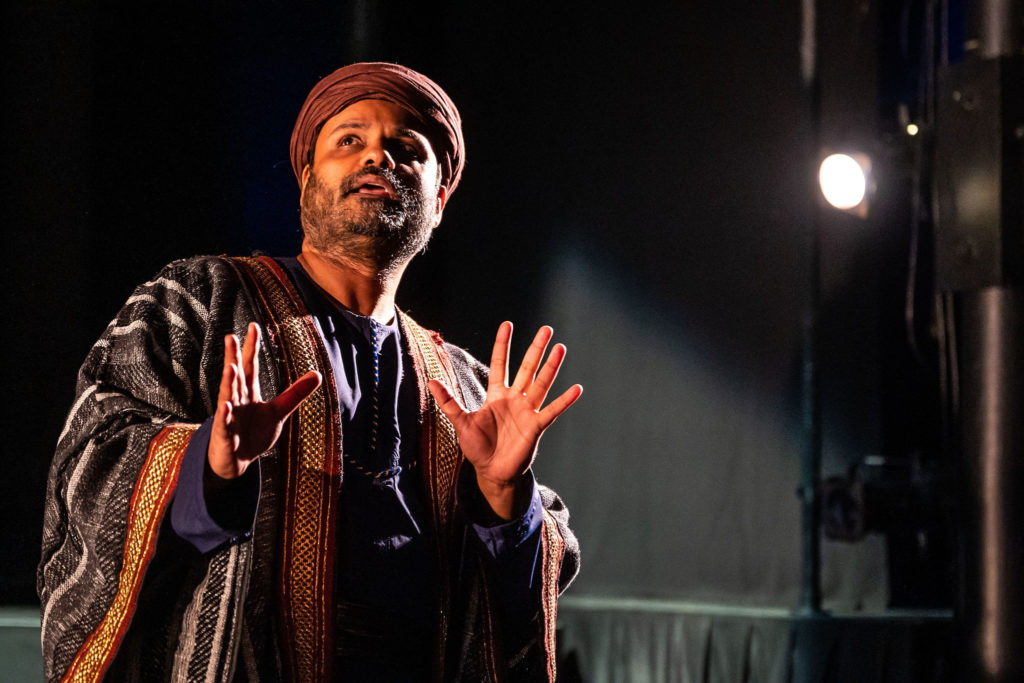
Live and in person at Theatre Passe Muraille, Toronto, Ont. until May 1, 2022.
Written by Azeem Nathoo
Directed by Jamie Robinson
Choreographed by Roula Said
Set and costumes by Anahita Dehbonehie and Niloufar Ziaee
Lighting by Jennifer Jimenez
Sound by Maddie Bautista
Composer, Roula Said
Cast: Walter Borden
Joella Chrichton
Quancetia Hamilton
Azeem Nathoo
Neta J. Rose
Roula Said
Adriano Sobretodo Jr.
Johnny Thirakul
Jennifer Villaverde
A well-intentioned, earnest attempt to examine the fall of the Muslim Empire in Andalusia and Jewish, Christian and Muslim coexistence in the 12th century.
The Story. Ibn Rushd is a Muslim scholar, educator, scientist and personal physician to the Almohad Caliphate in Andalusia, in 1184. Times are calm with Jews being welcomed and protected in Andalusia, living peacefully with Christian and Muslims. But trouble is brewing. The Caliphate has died mysteriously. His hot-headed-hedonistic son Ya’qub assumes his place and now wants to wage war on his various enemies outside the city. A woman pilgrim with an important task seeks Ibn Rushd to try and arrange a peace with one of their enemies who are Christian. Suddenly matters are not so peaceful for the Jews. Ibn Rushd tries to negotiate a secret peace. It gets messy.
The Production. Playwright Azeem Nathoo was fascinated by so many questions and aspects of religion in Andalusia in Medieval times. Initially he was curious about whether the peoples of Judaism, Christianity and Islam could live together in peace and if so why and if not why? There is a lot of history on both sides of the questions to ponder. He was fascinated by the literature and scientific artifacts that were used by Jews and Muslims in mathematics. He was curious about the truth of various incidents in history as it pertained to the three Abrahamic religions.
The play touches on some of these aspects without much development such as noting some revered books and the previously mentioned mathematical device. That Jews, Muslims and Christians lived in peace in Andalusia is referenced in a short reference.
For the most part 1184 is a dramatization of how Ibn Rushd acted as a diplomat/scholar/teacher to ease troubled waters in the city and then trying to quell rebellion between the Muslims and each other and then the Muslims and the Christians. The few Jews noted in the play spent most of their time either hiding or trying to escape from their enemies. For all his calmness and clarity of thought Ibn Rushd was overwhelmed by corruption, animosity, gossip and warring factions. Times don’t seem to have changed. As a first play by Azeem Nathoo, it’s well-intentioned and earnest.
Azeem Nathoo writes in a vaulted language that has enough character that could make it seem as if it would come from Medieval times. But at times the play seems plodding. Director Jamie Robinson uses the set well, negotiating his actors to use the main space, the balconies and stairways to give the sense of swift movement. Azeem Nathoo plays Ibn Rushd with calmness and quiet dignity. As Moses Maimonides, Neta J. Rose gives the character an almost modern sensibility and humor. More work needs to be done on the cast enunciating with more clarity and projecting so that the audience can hear. Many in the cast could use more rehearsal to nail down their parts.
The production is sumptuous and beautiful. The set by Anahita Dehbonehie and Niloufar Ziaee is simple but evocative. Two pillars of material? Light? are on either side of a central staircase representing one area of the story and later the throne of a leader. There are side areas indicating Ya’qub’s (Adrian Sobretodo Jr.) bedroom; and another area up above representing the palace of the Caliphate and his Queen (Quancetia Hamilton). The costumes also by Anahita Dehbonehie and Niloufar Ziaee are rich in brocade, gold trim, enveloping robes for the Muslims—the one for Ibn Rushd (Azeem Nathoo) is particularly stunning. The costumes are equally beautiful for the Christians and simple coverings for the Jews. The Muslims wear head coverings similar to turbans, while the two Jews in the story vary in the head coverings. A bookseller (Walter Borden) wears a fez and Moses Maimonides (Neta J. Rose), a contemporary of Ibn Rushd wears a yarmulka. The design of the stage floor has markings from the three religions. The lighting by Jennifer Jimenez is also effective in being moody, provocative, seductive and secretive. Roula Said has composed a score with songs that capture the mysticism of those times. And Maddie Bautista’s sound design puts us into that world steeped with intrigue and danger around every billowing curtain.
Comment. The premise of exploring the many and various questions cited by Azeem Nathoo for 1184 was promising. I wish more of it was realized in the actual work. I was reminded of another exhibit/play that was co-produced by the Aha Khan Museum. Super-knitter, Kirk Dunn, created The Knitting Pilgrim in which he talked about three huge panels that he knitted over 15 years that depicted the commonality and conflicts between the three Abrahamic religions: Judaism, Christianity and Islam. Stunning and informative.
A co-production between Phoenix Arts and the Aga Khan Museum.
Plays until May 1, 2022.
Running time: 2 hours (with an intermission).
www.passemuraille.ca